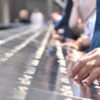In my earlier essay posted on the SSRC website,1The essay later appeared, with some modifications, as an article in the journal Ethnicities 4, no. 4 (2004): 451–76. I spoke of the “tragic predicament of a diaspora caught between deeply felt loyalties, at an historical moment not of its own making. Most British Muslims in the diaspora,” I commented, “witnessed the collapse of the World Trade Center’s twin towers on television, sitting in their living rooms, with the same helpless sense of horror as Western spectators. As it emerged that an obscure Islamist, Osama Bin Laden, and his Al-Qaeda clandestine global network, were probably responsible for the devastation, it seemed that the clash of civilizations predicted by Huntington between Islam and the West had finally materialized. At that moment diaspora Muslims in the West became symbolic victims of a global mythology, caught in a spiral of alienation and ambivalent identifications that no local protestations of innocence could counter.”
The events of September 11 were particularly tragic for the Pakistani diaspora of Britain because in the decade since the Rushdie affair and the Gulf War, the majority had begun to move on, away from religious radicalism to more positive activism for multicultural rights. Young British Pakistanis were increasingly taking their full place in society. With the first generation of immigrants at the point of retirement, the days of strangerhood seemed to be over for many. But the radical estrangement that September 11 and the wars in Afghanistan and Iraq inaugurated challenged this path of integration for the next decade, at least in the perception of the majority society.
The vulnerability of diaspora
The events following September 11 highlighted the vulnerability of the Pakistani diaspora in Britain, and Muslim diaspora communities worldwide, to the impact of critical historical events. This vulnerability underlines the futility of any attempt to define diasporas simply in terms of their origins (slavery, genocide, indentured labor, and so forth) or by type (“victim,” “trade,” “cultural,” “labor,” “imperial”).2Robin Cohen, Global Diasporas: An Introduction (Seattle: University of Washington Press, 1997). Paradoxical as this may sound given the stress on specific origins, such typologizing lacks a theory of history. Viewed historically, it is evident that, whatever their origins, the experiences of different diasporas frequently converge. In particular, labor and trade diasporas often become targets of majority violence, especially if they achieve economic success, as Armenians and Jews did in some historical periods. Such middleman minorities are particularly vulnerable, as shown by the cases of Indian and Chinese labor-cum-trading diasporas in places as far apart as Sri Lanka, Fiji, Uganda, and Indonesia. Diasporas, whatever their origin, appear to be susceptible to being constructed as dangerous outsiders with loyalties beyond the nation-state.
In trying to impose order on an apparently out-of-control diasporic proliferation, typologies shift attention from a critical characteristic of diasporas, namely, their past or future political vulnerability. The Jewish and Armenian diasporas have known periods of immense prosperity and creativity, but by the same token, they have suffered long periods of intense misery, deprivation, and exclusion, of pogroms and genocides
The majority of Pakistanis who migrated to Britain, like other Muslim migrants to Europe and the United States, came as economic labor migrants. The decade since 9/11 has seen these migrants repeatedly become targets of xenophobic fears and often sheer hatred, expressed by fellow countrymen and even political elites, because of their religion. Born and bred in the diaspora, they have nevertheless often felt like rejected outsiders and second-class citizens.
Diaspora in history: From the Arab Spring to a Birmingham peace rally
But there is also a flip side to this historical fate of diasporas. If September 11 highlighted an apparent moral chasm between Muslims and so-called Westerners, the Arab Spring has underlined their commonalities and shared humanity. The aspirations of Egyptians, Tunisians, Libyans, Yemenis, Syrians, Bahrainis, and other communities throughout the Middle East for democracy and social justice and an end to authoritarian regimes and corruption has stunned the world, overturning prior Islamophobic canards. Most remarkable have been the nonviolent and egalitarian nature of the protest movements and their inclusiveness—intellectuals and peasants, students and workers, men and women, secular and religious—as well as the fact that they have been dominated by young people, with a popular, grassroots leadership, communicating via social media.
The impact of Tahrir Square’s courageous stance in demand of cosmopolitan social justice has been global, reaching from Spain to Botswana and Israel, where I personally witnessed its echoes. It was sad, therefore, to arrive back in Britain to violent and destructive urban riots in August 2011. Some years previously, there had been riots in British northern cities, in Oldham and Bradford, in which Pakistanis defending themselves against the perceived threat of the British National Party clashed with police, with many injuries and serious damage to property. Rioters were handed down extremely harsh prison sentences and the diaspora was accused of deliberate “self-segregation.” Although the 2011 riots were not race riots, the murder of three young Pakistanis in Birmingham, run over by local looters while defending their businesses, threatened to erupt into a clash between ethnic groups in the city.
To avert any violent retaliation and further deaths, Tariq Jahan, the father of one of the young victims, a Pakistani born in Britain, the son of immigrants, and now a man in his fifties, appealed in the midst of his grief for calm, as crowds of young Asians gathered outside his house. Speaking in a dignified, sometimes faltering voice, he pleaded with them not to avenge his son’s death. His inspiration led to a peace rally, organized the following day, “One City, One Voice for Peace,” which gathered together all the different communities of Birmingham: Asians, black and white, Muslims, Sikhs, Hindus, and Christians.
Addressing the large crowd, Mr. Jahan articulated a vision of living together in peace in the diaspora. He spoke humbly: “What I can ask for is, forget about me, I am nobody, but try to remember the three men who sacrificed their lives for the community.” He stressed both his faith and the inclusivity of his city: “It’s the month of Ramadan. As a Muslim, I believe this is a very auspicious month for Muslims. We believe that the gates of heaven are open and the gates of hell are shut this month. So that gives me the strength to believe that the three boys didn’t die in vain. They died for this community.” He told the crowd he was overwhelmed by the response to his call for peace: “From the local community, and nationally, throughout the country, across the world, I’ve had letters, phone calls, and I don’t know how to respond. I . . . I’m one of you, the people, nobody special, nobody important.” He thanked young people for staying calm and the police and media for their consideration.3“Father Pays Tribute at Birmingham Peace Rally,” BBC News video, August 14, 2011, http://www.bbc.co.uk/news/uk-14523363; and Rahila Bano, “Haroon Jahan: Grieving Father Pays Tribute to Son,” BBC News, August 16, 2011, http://www.bbc.co.uk/news/uk-14537483.
This was a far cry from Tahrir Square, but the stress on values of peace, and the capacity to mobilize the citizens of the city irrespective of race and religion, had made Mr. Jahan a local, national, and even international hero. His vision of a cosmopolitan “community” living together in peace proves that the story of diaspora is never finished. Diasporas are continually negotiating the parameters of their citizenship and continuously producing new, talented voices. Recent outstanding examples in the UK Pakistani diaspora are the postcolonial novelists Kamila Shamsie and Nadeem Aslam, who write with the sensitivity, depth, and grace of acute yet humane observers of their own torn society, while making a valuable contribution to English world literature. They are not alone. September 11, it seems, has not been able to crush people’s will to seek ways of living in amity across religious and ethnic divisions.
Conclusion
After September 11, 2001, despite protestations from Muslim and Islamic scholars, the vision of a clash of civilizations between a liberal, tolerant, “open” West and a violent, illiberal, intolerant Islamic world was increasingly adopted by politicians and much of the Western and Islamic media. Their view was of a Manichean world order, sometimes phrased in religious terms as a battle between good and evil. The image of unmitigated intolerance and violence they projected refracted onto Muslim diasporas of immigrant-settlers in Europe and America. It seemed to be proven by young Western-born Muslims’ suicide bombings in Madrid and London and by other seditious plots uncovered during the following decade.
The resulting xenophobic and racialized stigmatizing of Muslim diasporas in Europe and America highlighted, I have argued here, the vulnerability of diasporas to historical events beyond their control. Against simplistic typologizing of diasporas by genesis and origin, it seems more accurate to argue that diasporas are made and remade historically: they must continuously negotiate their citizenship rights and full membership in their adopted nations.
The Arab Spring, epitomized symbolically by Cairo’s Liberation Square, was an unanticipated, visionary development that overturned all prior stereotypes of the Muslim world. “They” became one of “us.” The West and the rest were no longer, it seemed, locked in cosmic battle, but were members of a single cosmopolitan world. The events are still recent and their implications yet to be fully played out for Muslim diasporas worldwide. Old racist stereotypes die hard. Many on both sides have a stake in perpetuating entrenched hatreds and fears. But whether religious or secular, Tahrir Square proved that ordinary Muslims both at home and in the diaspora share the same values of social justice, transparency, humanity, and peace that animate the rest of us ordinary folk; these can no longer be said to be the prerogative of a superior West.
Pnina Werbner is professor emerita of social anthropology at Keele University. She is author of the Manchester Migration Trilogy, which includes The Migration Process: Capital, Gifts and Offerings among British Pakistanis (1990/2002); Imagined Diasporas among Manchester Muslims: The Public Performance of Pakistani Transnational Identity Politics (2002); and Pilgrims of Love: The Anthropology of a Global Sufi Cult (2003); and editor of Anthropology and the New Cosmopolitanism: Rooted, Feminist and Vernacular Perspectives (2008). Recent projects include research on black Africans in London, Filipinos in Israel and Saudi Arabia, and the Manual Workers Union of Botswana.













